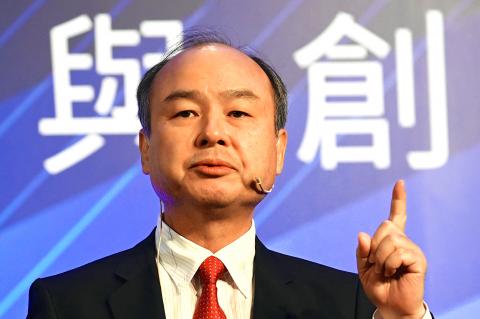Chip designer ARM Holdings PLC, which has close ties to Taiwan Semiconductor Manufacturing Co (TSMC, 台積電), plans to increase its investments in Taiwan, owner Masayoshi Son said on Saturday.
The Japanese billionaire and founder of Softbank Group Corp said that he wants to relist ARM within five years, reintroducing stock markets to the British chipmaker that his company bought for US$32 billion in 2016.
Softbank has not yet decided where the public offering would be held, Son told a technology forum in Taipei.

Photo: Sam Yeh, AFP
In his first public speech in Taiwan, Son said that artificial intelligence (AI) and the information revolution represent the biggest shift in human history, with AI set to dominate technology development trends and improve human lives, rather than take away jobs.
After the forum, which had the theme “Transformation of global technology industries and capital flows,” Son told reporters that ARM would expand its investments in Taiwan in areas such as the Internet of Things and autonomous vehicles, and would hire more engineers, as well as research and development specialists.
The performance of the nation’s semiconductor and technology industries has been outstanding, he said.
Founded in 1990, ARM quietly grew into the UK’s largest listed tech company before Softbank’s takeover. It designs chips that are licensed to the world’s largest technology companies, and, as a result, just about every smartphone, mobile phone and tablet runs on an ARM chip.
On ARM’s relationship with China’s Huawei Technologies Co (華為), which is facing US restrictions, Son said that ARM respects both the US and the firm’s links with China.
The British chipmaker is complying with US restrictions on Huawei and is seeking clarification on them, Son said.
In response to a question by Hon Hai Precision Industry Co (鴻海精密) founder Terry Gou (郭台銘) on maximizing returns on government-run funds, Son said that there are low-risk methods such as system reform, expert recruitment and maintaining a goal of high returns.
Son said that he would be willing to offer his investment experience and ideas to help the government improve the performance of its national pension fund.
Gou is seeking to obtain the Chinese Nationalist Party’s (KMT) nomination to become its presidential candidate in next year’s election.
One of the main planks of Gou’s platform has been restoring benefits to retired military personnel, civil servants and public-school teachers, which were cut last year to help keep the financially strapped pension system afloat.
Additional reporting by Bloomberg

STEEP DECLINE: Yesterday’s drop was the third-steepest in its history, the steepest being Monday’s drop in the wake of the tariff announcement on Wednesday last week Taiwanese stocks continued their heavy sell-off yesterday, as concerns over US tariffs and unwinding of leveraged bets weighed on the market. The benchmark TAIEX plunged 1,068.19 points, or 5.79 percent, to 17,391.76, notching the biggest drop among Asian peers as it hit a 15-month low. The decline came even after the government on late Tuesday authorized the NT$500 billion (US$15.2 billion) National Stabilization Fund (國安基金) to step in to buoy the market amid investors’ worries over tariffs imposed by US President Donald Trump. Yesterday’s decline was the third-steepest in its history, trailing only the declines of 2,065.87 points on Monday and

TAKING STOCK: A Taiwanese cookware firm in Vietnam urged customers to assess inventory or place orders early so shipments can reach the US while tariffs are paused Taiwanese businesses in Vietnam are exploring alternatives after the White House imposed a 46 percent import duty on Vietnamese goods, following US President Donald Trump’s announcement of “reciprocal” tariffs on the US’ trading partners. Lo Shih-liang (羅世良), chairman of Brico Industry Co (裕茂工業), a Taiwanese company that manufactures cast iron cookware and stove components in Vietnam, said that more than 40 percent of his business was tied to the US market, describing the constant US policy shifts as an emotional roller coaster. “I work during the day and stay up all night watching the news. I’ve been following US news until 3am

Six years ago, LVMH’s billionaire CEO Bernard Arnault and US President Donald Trump cut the blue ribbon on a factory in rural Texas that would make designer handbags for Louis Vuitton, one of the world’s best-known luxury brands. However, since the high-profile opening, the factory has faced a host of problems limiting production, 11 former Louis Vuitton employees said. The site has consistently ranked among the worst-performing for Louis Vuitton globally, “significantly” underperforming other facilities, said three former Louis Vuitton workers and a senior industry source, who cited internal rankings shared with staff. The plant’s problems — which have not

TARIFF CONCERNS: The chipmaker cited global uncertainty from US tariffs and a weakening economic outlook, but said its Singapore expansion remains on track Vanguard International Semiconductor Corp (世界先進), a foundry service provider specializing in producing power management and display driver chips, yesterday withdrew its full-year revenue projection of moderate growth for this year, as escalating US tariff tensions raised uncertainty and concern about a potential economic recession. The Hsinchu-based chipmaker in February said revenues this year would grow mildly from last year based on improving supply chain inventory levels and market demand. At the time, it also anticipated gradual quarter revenue growth. However, the US’ sweeping tariff policy has upended the industry’s supply chains and weakened economic prospects for the world economy, it said. “Now